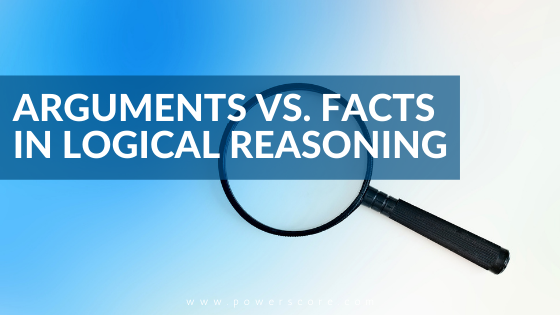Recognizing Argumentation
One of the most important tasks facing test takers in the Logical Reasoning section is the ability to accurately identify the presence of argumentation. “Argumentation” can be summed up as an author’s attempt to persuade the reader to believe that the author’s opinion is correct. While that seems simple enough, it’s not always that easy to spot.
Argumentation on the LSAT is often in shades of gray as far as degree or obviousness of the opinion given. While many statements appear heavily skewed towards opinion (“I believe that the proposed tax reduction is a good idea”), and many are given as almost purely factual (“Everyone in the room is wearing black shoes”), some seem to fall in the gap between the two. Naturally this presents a challenge in terms of quick classification.
Consider the following sentence. “Heavy rainfall is likely to continue in the coming months.” That seems more opinionated than a simple, factual statement. It deals with thinking something about the future as opposed to knowing something about the past/present (like “today is Thursday”). At the same time it seems more factual than a statement of pure belief, like “We should be grateful for more rain.” The nature of individual statements and their wording play an important role as you seek to make the fact vs. argument distinction.
Context is Key
Another key factor also comes into play: context. A fact is something that is given as true and that you as a test taker can accept as true. A conclusion is something the author feels is true, but that you should scrutinize and question. Accept a fact; challenge a conclusion. The heavy rainfall example could be given as a factual premise (“Heavy rainfall is likely to continue in the coming months”). If we get any more rain our crops will all die. Therefore, our crops will likely die in the coming months.”
Or it could be used as a conclusion (“The first storm of spring indicates that several months of heavy rainfall will immediately follow”). We are currently having our first spring storm. Thus, heavy rainfall is likely to continue in the coming months. The same statement can serve as a fact (premise) or an opinion (conclusion) depending solely on the information surrounding it.
Be wary of trying to categorize everything you encounter into either pure fact or pure argument based only on a single word or sentence. This is a test that usually does not lend itself to absolute, black-and-white categorization on such a limited/confined scale. The specific construction of a statement combined with the surrounding information must be considered before assigning a label like “fact,” “premise,” or “conclusion” to an individual stimulus element.
Question Everything
And even if/when you are able to perfectly assign those labels, a bigger, more important task still exists. Once you recognize something in the form of an argument/opinion, begin to question it. Consider the pieces used to arrive at that opinion (premises) to reveal the validity of the opinion/argument in question. Does it follow perfectly and without doubt from the supporting facts? This is particularly important when the statement is a strong conclusion or clear opinion. If the information in question seems more factual, consider the conclusions that would result from that information being true. This allows you to determine valid inferences that would follow from the facts that you’ve been given.


Leave a Reply